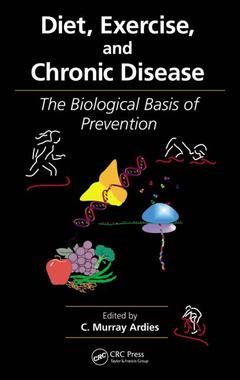Description
Diet, Exercise, and Chronic Disease
The Biological Basis of Prevention
Coordinator: Ardies C. Murray
Language: English
Subjects for Diet, Exercise, and Chronic Disease:
Keywords
Proinflammatory Signaling; Redox Control; exercise; T1 Dm; weight control; Enhance DNA Repair; chronic disease; DNA Repair; phytochemicals; Insulin Resistance; diet; Soluble IL-1 Receptor Antagonist; oxidant stress; Inflammatory Signaling; inflammation; Signal Transduction Pathways; atherosclerosis; Insulin Sensitivity; cancer; DNA Damage; osteoporosis; Ala Intake; neurodegenerative disease; JNK MAPK Pathway; diabetes; ALS Patient; DNA Methylation; GDM; Gestational Diabetes; AgRP; Adiposity Signals; MEDITERRANEAN Diet; RANKL Rank Interaction; Mitochondrial Biogenesis; Stem Cell; Satiation Signals; Energy Balance
· 15.6x23.4 cm · Hardback
Description
/li>Contents
/li>Readership
/li>Biography
/li>
Exercise and diet are key factors in the etiology and prevention of chronic disease. While most books on chronic disease have a decided clinical approach, Diet, Exercise, and Chronic Disease: The Biological Basis of Prevention brings together the latest cellular- and molecular-based research on the etiology of chronic diseases and the impact of various aspects of diet and exercise on the causal mechanisms. By focusing on cellular biology, details of the integrative nature of the many different underlying factors are revealed?details that are not evident with the prevailing clinical approach to chronic disease.
This book highlights chronic diseases that are major causes of mortality, and which have sufficient molecular evidence for dietary and activity-related components to their etiology. Individual chapters examine the role of diet and exercise in diabetes, atherosclerosis, osteoporosis, cancer, and neurodegenerative disease. They cover aspects such as disease etiology, effects of diet and exercise, and the cellular and molecular mechanisms of how various dietary components and repeated exercise alter disease etiology to contribute to disease prevention.
Since inflammatory signaling is a fundamental component of the chronic diseases discussed, the book includes a separate chapter on inflammation and innate immune responses. Obesity as a contributing factor is addressed within the specific disease chapters. The book also reviews what is known about the factors that influence food intake in humans. This reference translates molecular-based data on etiology and prevention into a clinical prescription for the prevention of chronic disease.
Introduction. Inflammation. Diabetes. Atherosclerosis. Osteoporosis. Cancer. Neurodegenerative Disease. Hunger and Satiety Signaling. Summary and Recommendations. Index.
C. Murray Ardies, Ph.D., earned a multidisciplinary doctoral degree at The University of Texas with majors in pharmacology, nutrition, and exercise physiology. In 1989, he joined Northeastern Illinois University, where he has worked on defining mechanisms through which repeated endurance exercise reduces risk for chemical toxicities and cancer. As part of this work, he was among the first to demonstrate that beneficial alterations in cellular function were tied to a generalized stress response mediated by the activation of the AP-1 response element in nuclear DNA.




